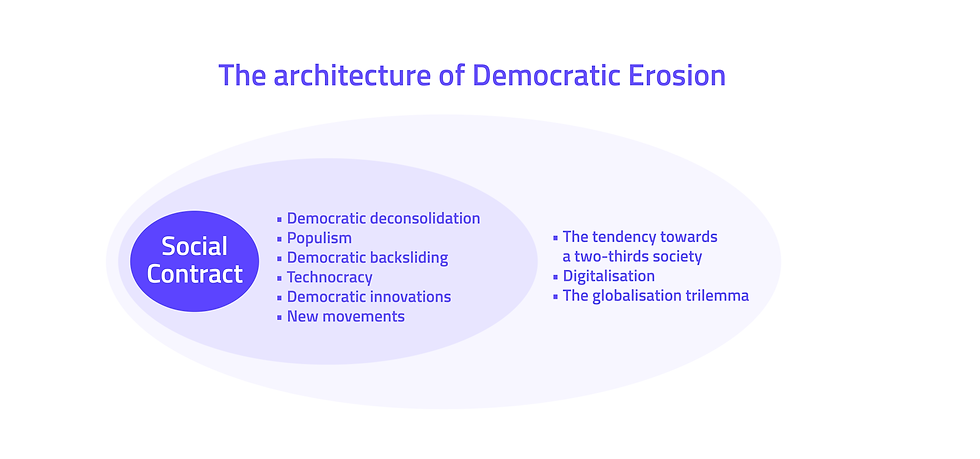Greetings From The 28th International Political Science Association’s conference in Seoul
- Aug 15, 2025
- 3 min read

From July 12 to 16, 2025, the International Political Science Association (IPSA) World Congress was held in Seoul, South Korea, with the participation of several researchers of the CO3 project: Emilia Palonen, Szilvia Horváth, and Alexander Alekseev (University of Helsinki), Ruzha Smilova and Daniel Smilov (Center for Liberal Strategies, Bulgaria), Ana Matan (University of Zagreb, Croatia), Stephen Sawyer and Nathanael Colin-Jaeger (American University of Paris, France).
A pre-event brought together academics from Europe and South Korea
Before the conference, on July 11, the team held a pre-conference afternoon with Seoungwon Lee, at Seoul National University, co-hosted by the Seoul National University Centre for Asian Urban Societies (CAUS).
The Social Contract in Question: Polarisation, Populism, Hegemony and Space workshop was an encounter between European and South Korean scholars, as well as other international scholars.
The workshop set out to examine whether the idea of the social contract—developed alongside the rise of modern political systems and democracy—can be treated as something people actively negotiate in practice, or used as a tool for understanding different political situations.
The first presentation by Emilia Palonen and Szilvia Horváth discussed the case of Hungary from a Laclaudian perspective, including the book presentation of Palonen’s Birth and Death of Democracy in Hungary, which accounts for the failed democratisation in Hungary from 1989, and democratisation leading to political polarisation as a political problem. The following presentation by Nathanael Colin-Jaeger offered a revised version of the political philosophy of the social contract.
CO3 research group members also participated in a fishbowl group discussion event focusing on current issues in the theory of social contracts.
Discussions on Social Contracts – From Contemporary Critiques to Local Contexts
At the IPSA World Congress on the theme of resisting autocratisation in polarised societies, members of the CO3 project presented the latest results of their research in a joint panel titled Continuous Social Contracts: Theoretical Foundations, Challenges, Case Studies, chaired by Stephen Sawyer.
The panel addressed contemporary critiques of social contract theory, based on the shared proposition that the exercise of government power over the people can only be legitimised through the continuous renegotiation of its foundations—what we refer to as “continuous social contracts.”
The presented papers offered critiques of existing social contract theory, proposed new theoretical models of continuous social contracts, and explored the resilience of such contracts at both national and supranational levels.
Emilia Palonen and Szilvia Horváth talked in their presentation “Hegemony, Radical Democracy and the Social Contract”, about a Laclaudian reinterpretation of the social contract, using recent developments in Hungarian politics as an example.
Ana Matan outlined the applicability of social contract theory to the international context, such as John Rawls’ The Law of Peoples, which would also be suitable for the EU while Ruzha Smilova discussed the conceptual and substantive dilemmas of resilience, social contract and democracy, offering a concise view of them.
In addition, CO3ers participated in various panel activities, including chairing and discussant duties.
The Populism and Polarisation General Track chaired and initiated by Emilia Palonen was for the first time in the IPSA WC programme. Daniel Smilov presented the paper “The Global Magnitsky Act as an Instrument of Political Ethics Regulation: The Case of Bulgaria” in the Understanding Political Ethics Regulation panel.
Alexander Alekseev’s paper, “Towards a Transnational Right-Wing Identity? The Case Study of the National Conservatism Conference in Brussels,” and Szilvia Horváth’s “The Illiberal Social Contract in Hungary and the Internationalization of Orbánism,” were presented in the panel chaired by José Olivas Osunas on nationalisms and radical politics.
As the Editor of the Abstracts in Political Science Stephen Sawyer took part in the roundtable discussion “Crafting Youth Path Through the Academic Publishing” and “Predatory Publishing and Ethics in Research: What’s up?”.
In addition, the PI of CO3 Emilia Palonen, chaired IPSA Regional Dialogues roundtable as she had been an Executive Committee member of the IPSA on academic freedom and best practices for academic survival. She also presented the AC/DT approach at the Interpretive Methods Café, bringing out the research done in the consortium of projects including the CO3.
In the Laclaudian roundtable “Author Meets Critics: Laclaudian Takes on Populism, Hegemony, and Performativity” alongside Samuele Mazzolini's and Giorgos Venizelos she presented her book Birth and Death of Liberal Democracy in Hungary: Populist Logic of Polarisation as Hegemony that came out in open access on 30 July 2025 from the Helsinki University Press in the pro et contra series of the Finnish Political Science Association.


